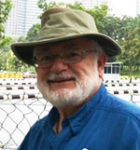By Oliver Pollak

SAN FRANCISCO — The 25th Annual Laborfest in San Francisco, held in July, is a month long celebration with 55 programs of remembrance, struggle, accomplishment and martyrdom. California Historical Society director Anthea Hartig opened an event at the CHS quoting James Baldwin – “American history is longer, larger, more various, more beautiful, and more terrible than anything anyone has ever said about it.”
Barry Nitzberg spoke in a public forum for the first time about his grandfather Sol Nitzberg, a Jewish Petaluma chicken farmer who was tarred and feathered on August 21, 1935 for organizing striking apple pickers in Sebastopol. Barry was accompanied by historian and attorney Kenneth Kann who had spent 18 years preparing an oral history based on more than two hundred interviews of Petaluma’s Jews; Comrades and Chicken Ranchers: The Story of a California Jewish Community, published by Cornell University Press in 1993.
Imagine, 1974 was 39 years after the event, and 2018 was 44 years after the book. Who would still be interested 83 years after the event? Well, an over-flow crowd of one hundred fifty people attended, some were sitting on the staircase. These children, grandchildren, great-grandchildren, and friends of Zionists, Communists, Socialists, the old left, anarchists and some red diaper babies listened intently and then asked questions, some of which recalled the tension between the Rechters (right wing) and Linkers (left wing), echoes of the McCarthy anti-communist inquisition, Israel socialism and Zionism in Israel.
Kann graduated from the University of Wisconsin and did his graduate work at Berkeley. He taught in the late 1960s at Black colleges in the south and was surprised that his students knew more about their Black heritage than he did about his Jewish heritage. With tape recorder in hand he embarked on interviewing Petaluma Jews. Barry Nitzberg graduated from San Francisco State University.
Petaluma is 35 miles north of San Francisco. In the thirties, before the interstate highway, that was a “long way from San Francisco.” It was a remote agricultural area, with a couple of thousand people, and about 100 Jewish families.
Sol Nitzberg was born in Bialystok, the son and grandson of Talmud scholars. Sol spent 10 years in the Yeshiva but gravitated towards mathematics, science and politics. He read Marxist pamphlets in Yiddish. He became imbued with fighting for rights and justice for the poorest. This earned him three years of hard labor in Siberia. He liked farm life, the natural rhythm, swinging the scythe in the tall grass, and working with his hands. He also liked to teach mathematics and science. When he returned to Bialystok he feared that the police had their eyes on him. His brother in America sent 200 rubles for passage to the United States. He learned English in night school, got a degree in electrical engineering, but did not like city life. He demonstrated his patriotism for America by enlisting in the U.S. Army and received an Honorable Discharge in 1919.
He built a life in Petaluma where hard work and credit helped acquire 6000 chicks. He met Millie and they married in 1927. They had two children. The confluence of his ideas about the rights of the laboring man, unionization, and the squalor of the Depression led him to the Communist Party. These ideas were anathema to the Chamber of Commerce, the rural elite, farm owners, Associated Farmers, Holly Sugar, Standard Oil, the Southern Pacific, the Santa Rosa Press Democrat and the Vigilantes who advocated harm to labor organizers.
The Great Depression brought 25 percent unemployment, falling commodity prices, a homeless rate of 15 percent, and foreclosure. Owners could not alter the markets or the Depression, they could cut labor costs. John Steinbeck’s novel The Grapes of Wrath (1939) describes the travail of the Okies. Farm owners undercut labor costs with Chinese, Japanese, Mexican and Filipino labor.
Three thousand apple pickers wanted a raise from 25 to 40 cents an hour, and a nine-hour day. A workers meeting in Germania Hall was broken up by a mob of 300 Vigilantes. Sol and Silva (Jack) Green could have been shot or lynched by the Vigilante who included farm owners, the County Sheriff, and other establishment citizens. Instead they shaved their heads, applied hot tar and feathers, and told them to get out of town. Sol retreated to the East Coast, with some thoughts of returning to Russia, but Millie would not be moved and they returned and resumed their chicken farming lives in Petaluma. Twelve Vigilantes were tried and acquitted.
Producing eggs moved to the Central Valley in the 1960s. Petaluma became a bedroom suburb of San Francisco. Labor unions have suffered major losses in membership. Immigration, nativism, racism, and the rights of labor to organize were in the cauldron and on the anvil 80 years ago and now.
Karen and I were so impressed with the program that we joined the California Historical Society.
*
Pollak, a professor emeritus of history at the University of Nebraska Omaha, and a lawyer, is a correspondent now based in Richmond, California. He may be contacted via oliver.pollak@sdjewishworld.com